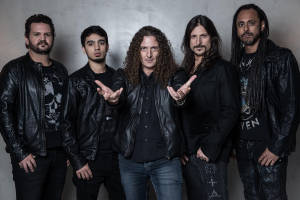
of a knight crusader known as The Shadow Hunter,
who joins the army of the Pope on the late XI
century. During his saga, his mind is often
perplexed by the antagonism of the Holy War and
afflicted by visions that conflict with his
devotion to the Church.
The beginning of the second millennium has a lot
in common with our times. The world was rapidly
changing. The Roman Empire's sovereignty was
succumbing to the rising power of Muslims,
Jewels, Christians and pagan conquerors. As the
Roman domain was falling apart, local wars were
frequent and the domination of the territories
changed on almost every decade. For different
reasons, these uprisings groups wanted to rule
Jerusalem (so-called Holy Land for the three
main religious nations and a very important
commercial center).
The cities in Europe and in the Minor Asia have
become very populated jobs were hard to find
and the people became unemployed and inactive.
That scenery made very easy for the Pope Urban
II to raise an army of European Crusaders to
conquer the land where Jesus was once crucified.
Lost and confused - due to the turbulent times -
they were easily led by the ideals of salvation
proposed by the Church. However, the mass of
ignorant and fanatic soldiers went out of
control, in total anarchy applied brutal and
merciless methods of devastation. The atavistic
instinct of the recent Christianized people
brought up the hatred and the fear of living on
that period. After one thousand years the
religion of Christ has become a paradox, killing
and torturing men to inflict the ideals of
fraternity. It was absorbed, mixed and adapted
to the roman imperialistic culture and Interests.
de um Cavaleiro Cruzado conhecido como O Caçador
da Sombra, que se une ao exército do Papa no fim
do século XI. Durante sua saga, sua mente é muitas
vezes desorientada pelo antagonismo da Guerra
Santa e afligida por visões que conflitam com
sua devoção à Igreja.
O início do segundo milênio teve muito em comum
com os nossos tempos. O mundo estava mudando
rapidamente. A soberania do Império Romano estava
sucumbindo ao poder crescente dos conquistadores
Muçulmanos, Judeus, Cristãos e Pagãos. Como os
domínios Romanos estavam desmoronando, guerras
locais eram freqüentes e o domínio dos territórios
mudou em quase todas as décadas. Por diferentes
razões, estas rebeliões queriam governar Jerusalém
(também chamada Terra Santa pelas três principais
religiões e por um importante centro
comercial).
As cidades na Europa e na Ásia Menor se tornaram
muito populosas. Trabalhos eram difíceis de
encontrar e o povo se tornou desempregado e inativo.
Aquele cenário facilitou muito para o Para Urbano
II criar um exército de Cruzados Europeus para
conquistar a terra onde Jesus foi uma vez
crucificado. Perdidos e confusos - devido aos
tempos turbulentos - eles eram facilmente levados
pelos ideais de salvação propostos pela Igreja.
No entanto, o grande número de soldados ignorantes
e fanáticos saiu fora do controle, em total anarquia
aplicavam métodos brutais e impiedosos de devastação.
O instinto atávico do povo recentemente
cristianizado trouxe o ódio e o medo de viver
naquele período. Após mil anos, a religião de
Cristo se tornou um paradoxo, matando e torturando
homens para impor os ideais de fraternidade.
Isto foi absorvido, mesclado e adaptado à cultura
e interesses imperiais Romanos.
